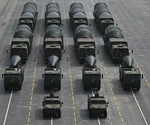
Countless suspected former ISIS fighters from foreign countries are being transferred to Iraq to face the court there and serve their sentences, and this is done illegally, Human Rights Watch senior researcher for Iraq Belkis Wille told N1.
Among them is a Bosnian national, who is currently being held in a prison in Erbil, Iraq, and might be facing the death penalty for having joined the Islamic State (ISIS) forces, N1 found out on Friday.
Human Rights Watch researchers in Iraq have registered a large number of foreign ISIS fighters being kept in Iraqi prisons after they were transferred from Syria, but Iraqi authorities refuse to submit exact data on the nationalities of those foreign fighters, Wille said.
Wille said Human Rights Watch knows this because its representatives attended the trials and that she followed them personally.
“They are being tried according to the Law on the battle against terrorism because of their membership in the so-called Islamic State in Iraq,” she said.
“They are being transferred to Iraq where they are tried and sentenced. It is fact that there is a group of French nationals, 11 of them, who were transferred to Iraq earlier this year where they were tried and sentenced and all of them received death sentences. However, I have to add that none of them have yet been executed,” she said.
HRW is not familiar with the case of the Bosnian national who may be facing the death sentence in detention, she said, but added that "there are a lot of foreigners here and they are being tried according to the same laws as Iraqis.”
“The Iraqi justice system does not differentiate between domestic and foreign nationals,” Wille said.
There are more than 700 women and children being held in Iraqi prisons, according to Human Rights Watch. The organisation does not, however, have information about how many foreign nationals or former ISIS fighters are being kept there.
“We know about more than 700 foreign women and children being held in two locations in Baghdad, but we also have information saying it could be a lot more. We don’t even have an approximate number for how many foreign men have been detained in Baghdad or Erbil in northern Iraq,” Wille said.
“Unfortunately, we also have no exact number for those who have been sentenced to death,” she added, but explained that a lot of foreigners are sentenced to either life in prison or death and rarely receive any lighter sentences.
She noted that the Iraqi anti-terrorism law only allows for two sentences for terrorism or affiliation with terrorist organisations - the death penalty and the life in prison.
She also explained that all children more than 9 years old can be held accountable for crimes according to Iraqi law and that children younger than that are usually kept in the detention centres together with their mothers.
There were cases where children were tried for illegally entering Iraq, she said. “This is even done in cases when they (the children) tell the judges that their parents made them do it or when they crossed the border together with them. Those children are in prison in Baghdad and they are serving their sentences there.”
The only way for those children to leave those prisons is for the countries they originate from to issue new documents for them and for Iraqi authorities to then allow them to leave the country and go home, she explained.
“Some countries have done this successfully. Turkey has recently taken over more than 100 Turkish children who were held in prisons with their mothers, but we still have hundreds who have not returned to their homes,” she added.
HRW believes that transferring foreigners from the northeast of Syria to Iraq for sentencing and serving the sentences should be banned, she said.
“We believe that because not only do we see a widespread use of torture in investigative processes, but also, generally speaking, defendants do not have access to basic rights, as I have said before, there is the use of the death sentence and prisons are overcrowded,” Wille said, adding that each country transferring its citizens there is doing so illegally.
“That is why we call upon countries to do all they can to ensure the return of their nationals and that proper investigations and trials are conducted - in case they determine that crimes were committed, but that needs to be done within national systems,” she said.
As for those who are already being held in Iraqi prisons, “their countries of origin should do all they can to make sure their citizens are not tortured, that they have a fair trial and all their right and to prevent death penalties being executed on them,” she stressed.
US President Donald Trump recently called upon all countries whose nationals were caught suspected of ISIS affiliation in the Syria-Iraq area to take them over, but Wille said that many countries have not done so.
This is especially the case with European countries, she said, explaining that they reject to put them on trial at home.
Kakvo je tvoje mišljenje o ovome?
Učestvuj u diskusiji ili pročitaj komentare





 Srbija
Srbija
 Hrvatska
Hrvatska
 Slovenija
Slovenija



























































